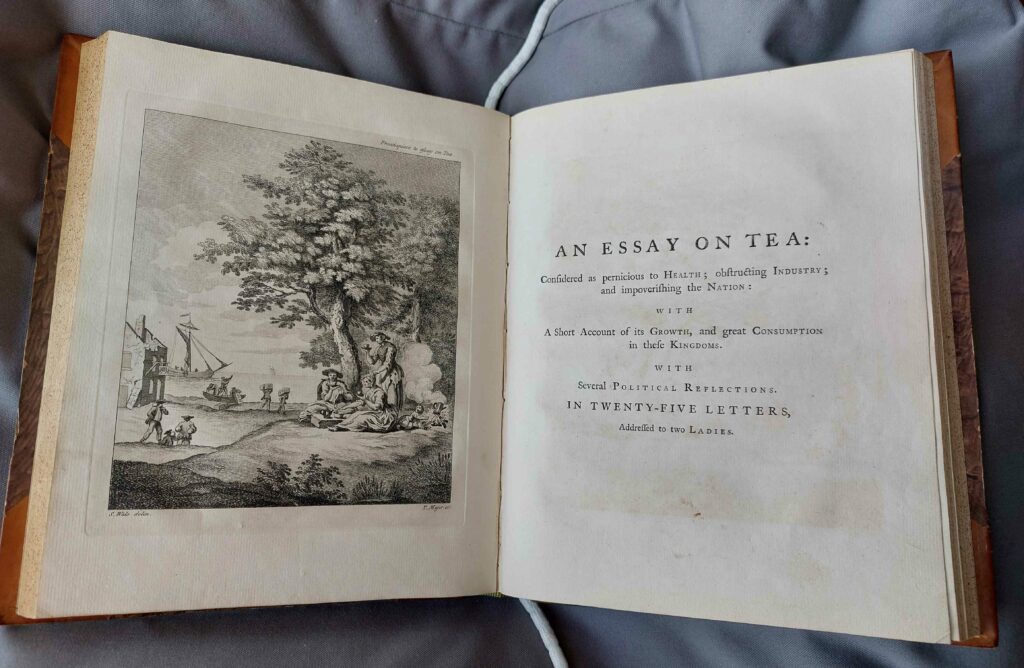There cannot be many homes or organisations in the UK where work is not interrupted for a hot drink and often the beverage of choice is tea. The word tea permeates our language – teatime, tea break, afternoon tea, teacup, tealeaves etc – and our supermarket shelves are filled with umpteen varieties of tea from many different countries. In short, tea is an accepted part of everyday life in Britain and we think nothing of it. Perhaps we might switch to a decaffeinated version of our favourite cuppa in order to improve sleep or other health problem; but not many of us stop to ask ourselves whether we should be drinking it at all.
But this was not always the case.
Our exhibition for 2024 is titled Travellers’ Tales and on display is a book published in 1756, written by Jonas Hanway, a London-based businessman, traveller and philanthropist (and supposed to be the first man in London to carry an umbrella.) The book takes the form of a journal in which Hanway described a journey made over eight days between Portsmouth and Kingston-upon Thames. He added to this an Essay on tea in which, over the course of twenty- five letters addressed to either Mrs D or Mrs O (whose identities are unclear) he set out the reasons for his staunch opposition to the use of tea brought to Britain from China.

Image: copyright The Library of Innerpeffray
With regards to health he opined that tea was ‘intoxicating’ people and turning their brains. Specifically, Hanway believed that tea was slowly poisoning people with copper, a substance used in the process of drying tealeaves.
He noted that the Chinese tended not to drink tea themselves, preferring to drink cold water where the supply was clean and safe. When they did drink it was normally unsweetened, a practice which Hanway applauded since he believed sugar to be harmful to health and to teeth in particular. Other effects on health set out in the essay included flatulence, bad breath, poor digestion, bowel complaints, fevers, poor sleep, paralytic disorders, trembling hands, hypochondria and an increased desire for gin. Hanway was not a doctor but he did not shy away from making medical statements. For instance he stated that in succumbing to the ‘tyrannical custom’ of daily tea drinking people were risking their health for ‘so low a gratification. His advice to ladies who suffered with ‘nervous complaints’ was to desist from drinking tea altogether since it provided no benefit to health or nutrition.
One of Hanway’s main arguments against the import of tea was that the absurd expense and the excessive time spent on tea ‘sipping’ was affecting the nation’s commerce, industry and agriculture. As a governor of the Foundling hospital in London he was particularly concerned about increases in infant mortality, which he believed were directly related to tea sipping (and gin consumption) in people he termed the working poor. He urged the richer members of society to set a good example – if they spent less time and money drinking tea, more opportunities for permanent employment of poor workers could be found. That would lead to better productivity and a reliable income would lead workers to better feed and care for their children, thus leading to an improvement in infant mortality. This would then benefit agriculture and commerce, would lessen the dependence on workhouses and foundling hospitals and increase the population available to man ships and fight in wars.
Hanway’s third main objection to tea concerned his belief that the import and smuggling of tea impoverished the nation. He believed that Britain spent far too much of its income on a single commodity and that this endangered the nation’s safety and ability to wage war. He came from a family with links to the navy and was interested in how it could be better manned, clothed and provisioned. The Essay on Tea was written at a time when another war with France was looming and so the ability for people to be able to work, pay taxes and be physically able to fight was paramount. Britain, Hanway thought, would benefit far more from following the example of the French when it came to tea- import better quality tea from China then sell it onto other countries at a large profit, thus retaining capital and monetary control in Britain. Again he urged the rich to set an example, as an act of patriotism – to give up tea willingly, to desist from dissipation and turn instead to more natural herbal infusions.
For more information on how to purchase one of these mugs from our online shop please follow the following link.
Or come and visit us in the library where you can see and buy the mugs in person. Great gifts! You can even have a cup of tea in our schoolroom.
S. Williams, May 2024.
Image: copyright of The Library of Innerpeffray.
